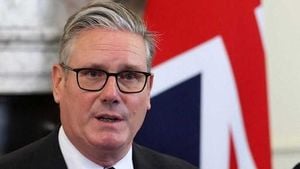Europe's natural gas reserves are running thinner than anticipated, leading to increasing concerns among major consumers like Germany about the potential for refill risks as winter approaches. With the continent relying heavily on these reserves, the situation has catalyzed urgent discussions surrounding energy management strategies and future supply chains.
The gas storage situation has seen levels deplete faster than expected, prompting warnings from Germany, the EU's largest gas consumer. This urgent need for replenishing supplies is highlighted by the higher prices anticipated as the summer heating season approaches, exacerbated by dwindling reserves. According to reports, the market has reacted accordingly, with suggested contracts for future summer supplies widening, marking a pronounced shift and creating challenges for energy buyers.
Specifically, the widening spread between contracts for summer versus the upcoming winter season has made it financially disadvantageous for companies to invest in stocking up on these energy resources. The premium for buying summer gas has surged to the highest levels witnessed since the peak of the energy crisis two years prior, raising flags about the sustainability of filling reserves adequately for the colder months.
This precarious situation highlights the vulnerabilities of the EU's energy infrastructure, which has been under strain from various geopolitical tensions, particularly heightened reliance on imports. Gas prices, implicitly tied with global markets, demonstrate exactly how interconnected and complex the energy supply chain has become.
Looking at the past year, Europe has made significant strides to diversify its energy sources, actively seeking alternatives to Russian gas, which was once the continent's dominant supply. The focus has now shifted toward reinforcing storage facilities and optimizing existing resources. Germany's warnings reflect not just national concerns, but summarize larger EU-wide apprehensions about energy independence, security, and resilience.
Germany's energy regulator has pointed out the necessity of developing strategic reserves and alternative supply routes to minimize risks. Current reserves are measured against upcoming demands, and industry analysts have raised concerns about not merely filling these storage tanks but ensuring quality and reliability as well.
The conversation surrounding gas inventories isn't merely about figures and economics; it also envelops mass public sentiment and voter priorities. The increasing anxiety correlates directly with broader public perception surrounding climate change and energy sustainability. Citizens appear acutely aware of how energy policy reflects on their daily lives and future living situations.
Overall, the EU's response to these challenges has involved securing long-term contracts with multiple suppliers, enhancing its energy transition plans, and investing heavily toward sustainable energy solutions. Yet, the immediate question remains: will these efforts be sufficient to keep the lights on and homes warm during the harsh winters?
With winter upon Europe, monitoring the developments surrounding gas supply is key. The EU's cooperation with neighboring countries and strategic sourcing will be pivotal during this period. The reality is, how well Europe manages its remaining gas supply will not only shape its energy future but also significantly influence its political relations on the global stage.
To effectively evaluate Europe’s readiness for the winter, energy watchers will be keeping close tabs on storage levels and pricing dynamics as they move through the coming months. The intersection of energy needs and geopolitical factors continues to underline the importance of strategic planning within the European energy sector.
This complex scenario serves as both a warning and learning opportunity for European leaders and citizens alike. The continued transition to alternative energy sources remains necessary, but the immediate need for managing the natural gas reserves stands out as one of the pressing issues the continent faces at this juncture.
Germany's proactive approach, signaling potential risks, will likely generate discussions on energy policy reform and might accelerate initiatives toward energy efficiency and conservation. The urgency accompanying this discussion could pave the way for more sustainable practices as Europe seeks pathways toward energy resilience.
Looking to the horizon, Europe finds itself at a crossroads, needing to find not just immediate solutions but long-term strategies to stabilize its energy needs against the backdrop of climate change pressures and the urgent demand for renewables. The challenge remains complex, but it is certainly not insurmountable.
At the play of market forces, government policies, and environmental commitments, Europe must forge its path, ensuring reliability through informed energy management decisions to embrace both challenges and opportunities head-on.
How Europe navigates through this delicate phase of energy dependence versus independence is worth close observation. The fine balance between addressing pressing winter needs and progressing toward sustainable energy futures will decisively shape the region's energy narrative going forward.



